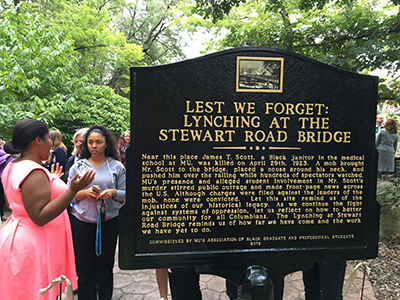Lynching on the MKT Trail
- Missouri Scholars

- Jun 26, 2019
- 3 min read
By: Heidi Hingst
At the academy, scholars have a chance to run on the MKT trail every morning for exercise, and approximately 20 scholars regularly attend practice to get in their daily run/jog. Each of these undoubtedly have noticed the elegant plaque that stands adjacent to the trail. It would be hard to miss the loud, bold lettering of the title that reads “Lest We Forget: Lynching at the Stewart Road Bridge.” Scholars may not realize how close this story was to the University of Missouri.
The plaque reads from start to finish, “Near this place James T. Scott, a Black janitor in the medical school at MU, was killed on April 29th, 1923. A mob brought Mr. Scott over to the bridge, placed a noose around his neck, and pushed him over the railing while hundreds of spectators watched. MU’s presence and alleged student involvement in Mr. Scott’s murder stirred public outrage and made front-page news across the U.S. Although charges were filed against the leaders of the mob, none were convicted. Let this site remind us of the injustices of our historical legacy. As we continue the fight against systems of oppression, let us reflect on how to better our community for all Columbians. The Lynching at Stewart Road Bridge reminds us of how far we have come and he work we have yet to do.” Below, in smaller text: “Commissioned by MU’s Association of Black Graduate and Professional Students 2016.

James T. Scott was thrown in jail under suspicion of sexually assaulting the fourteen-year-old daughter of MU’s then German professor. Cutting torches were used by the mob to break into Scott’s cell and he was dragged to the Stewart Road Bridge where he was lynched despite pleas of innocence. The lynching had a significant effect on the city of Columbia and on the university itself. Eighty-eight years after the fact, in 2011, community members came together to recognize the injustice done to James T. Scott. They unveiled a new headstone to mark Scott’s previously unmarked grave.

The back of the headstone told Scott’s story, and was then inscribed with “erected April 30, 2011 by the citizens of Columbia as a symbol of our commitment to a future in which people of all races will live together in peace and receive the fundamental rights of equal justice under the law.” Four years later, MU’s Association for Black Graduate and Professional Students commissioned the plaque that stands today for runners and bikers alike to read as they go about their daily exercise.

Bella Wiebelt-Smith, one of the MSA running regulars, was asked how the plaque — standing there in memory of James T. Scott — affected the mindset of people on the trail. Wiebelt-Smith responded that “it definitely brings a sort of weight… running by it, it’ll definitely carry a little more of a significance…” Another one of the morning runners, Isaac Opoku, upon hearing the story of James T. Scott, seemed at a loss for words. “[This] definitely changes the way I see the MKT Trail,” Opoku said. “I never thought it would be like that… never thought something like that would happen.”
Being a place that is so ethnically diverse, Missouri Scholars Academy is a place where social change is commonly addressed, specifically social change with regard to race. It is important for scholars to understand the injustice of the past, present, and how to erase those injustices for a more stable future for all.








Comments